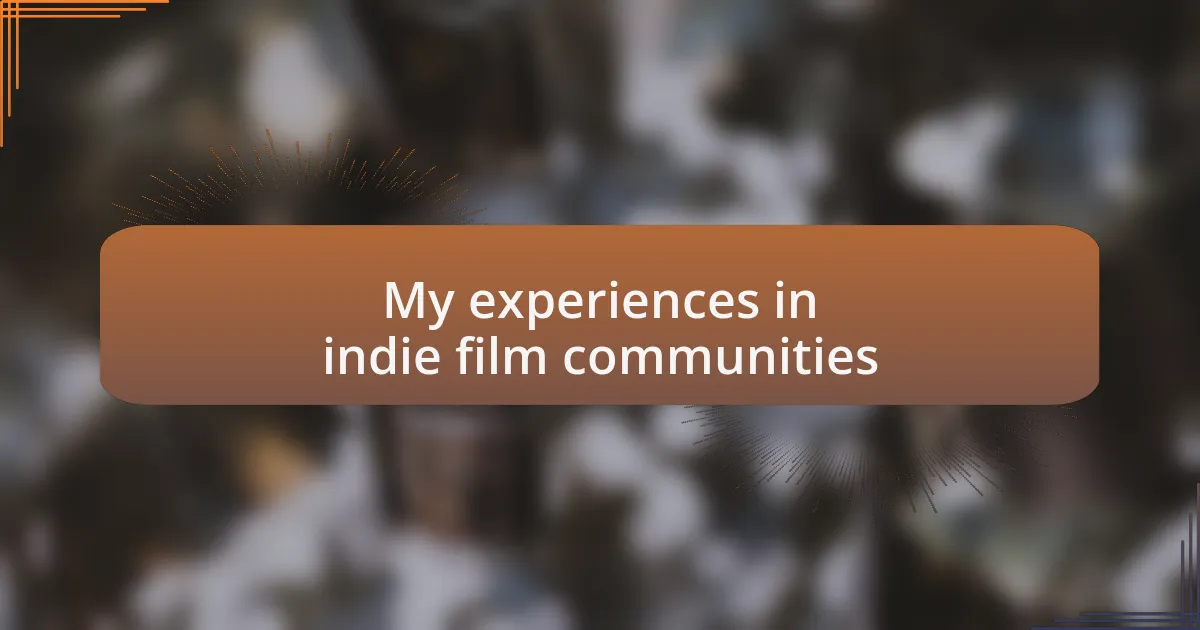Key takeaways:
- Independent film communities foster creativity and inclusivity, allowing diverse perspectives to unite and support emerging talent.
- Different types of indie film communities include local collectives, online forums, and genre-specific groups, each offering unique collaboration opportunities.
- Persistence in the face of rejection is crucial for filmmakers, as resilience can transform dreams into successful films.
- Collaboration and genuine storytelling are vital in indie filmmaking, with personal experiences often serving as the foundation for impactful narratives.
Author: Evelyn Hartwood
Bio: Evelyn Hartwood is a captivating storyteller and novelist known for her richly woven narratives and complex characters. With a passion for exploring the intertwining of human emotions and the natural world, her works often blend elements of magical realism with contemporary themes. A graduate of the Iowa Writers’ Workshop, Evelyn has published several acclaimed novels and short stories in prestigious literary magazines. When she’s not writing, she enjoys hiking in the mountains of her Pacific Northwest home and nurturing her garden. Evelyn continues to inspire readers with her unique voice and profound insights into the human experience.
Understanding independent film communities
Independent film communities thrive on the passion and creativity of their members. I remember attending a local screening where filmmakers shared their stories behind each project. It was inspiring to see how so many individual perspectives united to create a vibrant tapestry of art.
The beauty of these communities lies in their inclusivity. I often find myself pondering how supportive environments can nurture talent that might otherwise go unnoticed. It’s heartening to see seasoned filmmakers mentor newcomers, transforming fears into confidence and helping them navigate the often daunting industry.
I’ve also observed that collaboration is at the heart of independent film. Working with others fosters an enriching experience that enhances storytelling. During one of my projects, the collective brainstorm sessions were electric—everyone’s unique ideas sparked new directions, reminding me how essential dialogue and cooperation are in shaping impactful narratives.
Types of indie film communities
When I think about the types of indie film communities, a few standout categories come to mind. For instance, there are local filmmaker collectives that meet regularly to share resources and ideas. I remember joining one where we would set goals for our projects and celebrate each other’s milestones, creating a sense of shared progress and accountability.
Then, there are online indie film forums that connect people from around the globe. I’ve participated in several discussions that have sparked significant insights or even led to international collaborations. It’s interesting how these virtual spaces allow for diverse voices to flourish, blending cultures and storytelling traditions that might not intersect otherwise.
Another fascinating type is genre-specific communities, such as those focused on horror or documentary filmmaking. I once joined a horror film meet-up where the passion was palpable — everyone brought personal stories that influenced their work. Sharing these narratives not only strengthened our connections but also highlighted the unique ways different genres can evoke emotions and challenge perspectives. How can one genre shape a filmmaker’s journey? It’s an exciting thought that keeps emerging in these discussions.
Valuable lessons from indie filmmakers
One key lesson I’ve learned from indie filmmakers is the importance of persistence. I recall a director I met who had faced numerous rejections while trying to get funding for her first feature. Instead of giving up, she used those setbacks as motivation, refining her pitch and seeking out new opportunities. It made me realize that resilience is often the difference between a dream and a film that reaches audiences.
Collaboration is another vital aspect that stands out in indie film communities. I remember working with a group of filmmakers where each person brought unique skills to the table. This collective effort not only enriched our project but also taught me how essential it is to embrace diverse perspectives. Have you ever experienced a collaboration that shifted your creative outlook? It’s fascinating how teamwork can lead to breakthroughs that I would never have achieved alone.
Lastly, I’ve found that storytelling is at the heart of every great indie film. Listening to a cinematographer share how a personal family story became the basis for her short film was profoundly moving. It highlighted that the best narratives often stem from genuine experiences. Isn’t it powerful how our personal histories can shape our creative expressions? That connection between life and art is something I carry into every project I’m involved in.
